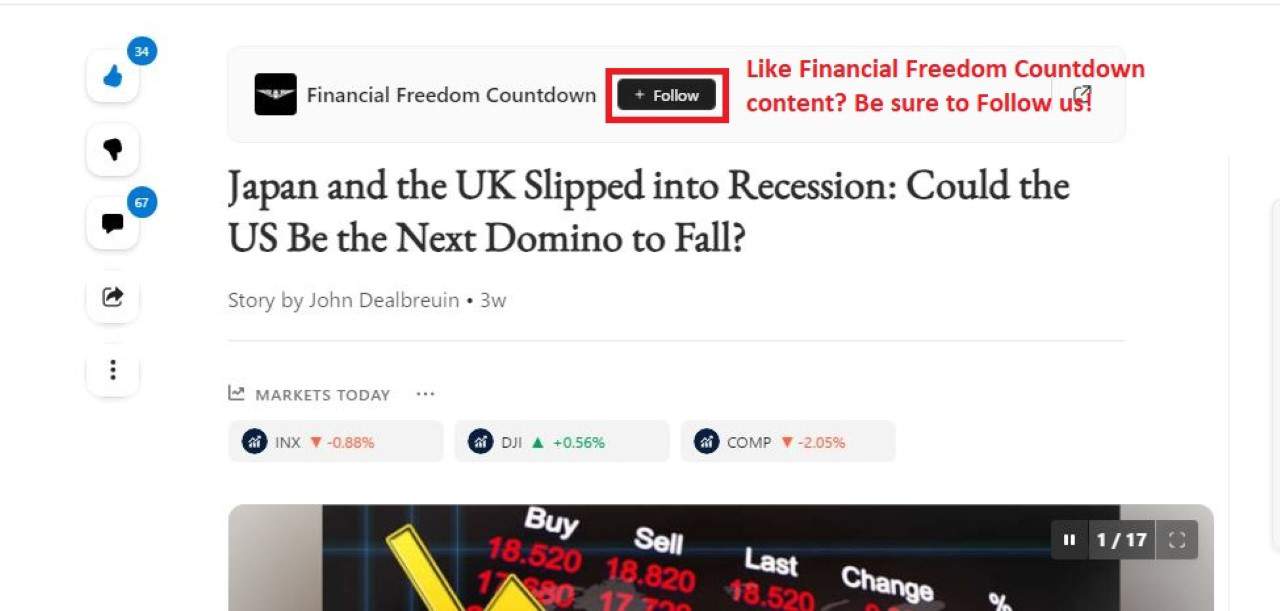Backdoor To Privatizing Social Security?” Trump’s Treasury Secretary Sparks Panic With Off-Script Remark – Financial Freedom Countdown
At a policy event hosted by Breitbart News, Treasury Secretary Scott Bessent may have said more than he intended.
While touting President Trump’s newly signed “Trump accounts” for American newborns, Bessent referred to them as “a backdoor for privatizing Social Security”; a phrase that lit a political firestorm and left many wondering: was it a slip, or a signal?
“In a Way, It Is a Backdoor…”

“In a way, it is a backdoor for privatizing Social Security,” Bessent said, describing how the new $1,000 investment accounts could grow into hundreds of thousands of dollars and potentially reduce reliance on government benefits in retirement.
The comment, made off-script, was startling; especially from a Treasury Secretary as Democrats have raised concerns regarding Social Security.
The Democrat leaning X account, FactPost posted the clip which went viral immediately.
In the clip Bessent said, “In a way, it is a backdoor way for privatizing Social Security. Social Security is a defined benefit plan paid out ‒ that to the extent that if all of a sudden these accounts grow, and you have in the hundreds of thousands of dollars for your retirement, that’s a game-changer.”
Rapid Walk-Back: Clarification or Cover-Up?

Within hours, Bessent issued a public clarification on X: “Trump Baby Accounts are an additive benefit for future generations, which will supplement the sanctity of Social Security’s guaranteed payments. This is not an either-or question: our Administration is committed to protecting Social Security and to making sure seniors have more money. This is why President Trump’s One Big Beautiful Bill gave tax cuts to those receiving these Social Security benefits — under @POTUS, we are working tirelessly to spread prosperity to all Americans.”
He insisted the administration remains committed to protecting Social Security.
But the damage was done. The question lingered: was Bessent revealing a long-term goal that the administration would rather keep quiet?
A Political Third Rail Gets Touched—Again

Social Security has long been considered untouchable in American politics.
Bessent’s comment immediately brought flashbacks to George W. Bush’s 2005 failed attempt to partially privatize the program.
In 2005, President George W. Bush introduced a proposal to let Americans direct a portion of their Social Security payroll taxes into private investment accounts tied to the stock market, but the initiative stalled in Congress and was never enacted.
Democrats wasted no time drawing parallels.
Democrats Seize the Moment: “They Said the Quiet Part Out Loud”

“Bessent actually slipped and told the truth: Donald Trump and his government want to privatize Social Security,” Senate Minority Leader Chuck Schumer said in a floor speech.
Rep. Brendan Boyle, D-Pa., reposting the clip on X, said “Trump White House openly admits their plan to privatize Social Security. I will fight them with everything I got to keep their grubby little hands off it.”
Alex Jacquez, who served as an Associate Director of Intergovernmental Affairs for Obama, retweeted the clip saying, “He said it!! He said Trump Accounts are a “backdoor to privatizing Social Security!” We’re supposed to claim that, you’re not supposed to admit it!”
Advocacy groups warned that the Trump administration was laying the groundwork for Wall Street to take over the retirement system.

President Trump has repeatedly vowed not to cut or privatize Social Security.
The “Big, Beautiful Bill,” which created the Trump accounts, made no direct changes to the program.
But Bessent’s comment has raised skepticism, particularly among critics who’ve long believed Republicans harbor privatization ambitions.
Was It Just an Offhand Remark?

Supporters argue Bessent’s words were taken out of context.
He was speaking casually at a friendly event, trying to explain how compound growth from baby accounts could ease pressure on public programs in the long run.
But even casual language can reveal strategic thinking.
A Window Into the Administration’s Real Thinking?

Bessent’s framing of the accounts as a “game-changer” for retirement has fueled speculation that the administration sees them as more than just a supplement.
If younger Americans grow up with large personal accounts, would political support for traditional Social Security begin to fade?

In the same speech, Bessent said Trump accounts would make “everyone a shareholder in the system,” and that people who feel invested in capitalism are less likely to challenge it.
Some analysts saw this as a philosophical argument for shifting retirement away from government and toward markets.
Political Fallout or Policy Preview?

Critics have interpreted the remark as a preview of where a second Trump term might head: not an outright cut to Social Security, but a gradual shift toward market-based alternatives.
Allies maintain the accounts are just one more tool for building wealth; not a Trojan horse.
Financial Literacy or Ideological Shift?

Bessent spoke of teaching working-class Americans to save rather than gamble on lottery tickets.
But is that about empowerment; or about reshaping how Americans think about retirement security? The line between personal responsibility and structural reform can be thin.
Will Voters Buy the Explanation?

Whether Bessent’s comment was a mistake or a hint at future policy remains unclear.
Although he was emphatic in his clarification post: it’s rekindled old fears, revived partisan battles, and raised a new question heading into the next election cycle.

Looking ahead, the future of Social Security remains uncertain.
While efforts to address criticism of Secretary Bessent’s comments continue, there is no long-term strategy for addressing the larger financial challenges the program faces.
With a growing number of beneficiaries and a looming insolvency crisis, Social Security will need substantial reform to remain sustainable.
The most recent estimates indicate that Social Security will be insolvent in less than a decade.
However, Congress has made no efforts to shore up the program for those who rely on Social Security the most.
Any efforts to reform Social Security would need a bi-partisan approach since at least 60 votes would be needed in the Senate.
Like Financial Freedom Countdown content? Be sure to follow us!

Starting August, the Social Security Administration begins clawing back overpaid benefits at a dramatically faster pace; slashing monthly payments by 50% for recipients with outstanding debts. The abrupt policy change, which affects hundreds of thousands of Americans, is part of the agency’s latest effort to recover an estimated $32.8 billion in overpayments made between 2020 and 2023. While only a small percentage of total recipients are impacted, those affected could now see half their monthly checks vanish; raising serious concerns about hardship among retirees and disabled Americans who rely on Social Security for basic living expenses.
Starting This Month, Social Security Slashes Checks by 50% for Overpaid Retirees
Congress May Auto-Enroll You in Medicare Advantage for 3 Years; Without Asking First

A new bill in Congress; H.R. 3467, could dramatically change how older adults enroll in Medicare starting in 2028. The legislation, sponsored by Rep. David Schweikert (R-AZ), would automatically place all eligible individuals into the lowest-cost Medicare Advantage plan in their area unless they actively opt out. This means millions of seniors could be enrolled into a health plan they didn’t choose, with networks, drug coverage, and out-of-pocket costs they may not understand until it’s too late.
Congress May Auto-Enroll You in Medicare Advantage for 3 Years; Without Asking First

Social Security beneficiaries are projected to receive a 2.6% Cost-of-Living Adjustment (COLA) in 2026, according to estimates based on the latest inflation data released by the Bureau of Labor Statistics on July 15, 2025. The adjustment, which determines how much monthly benefits increase to keep pace with inflation, is calculated using the Consumer Price Index for Urban Wage Earners and Clerical Workers (CPI-W). While this projected bump is slightly higher than the previous month’s estimate of 2.5%, it still falls short of covering rising living costs for many seniors.
Social Security’s 2.6% Projected COLA in 2026 Could Be Wiped Out by Rising Medicare Costs
New Mortgage Rule Lets Renters Use Payments to Qualify for a Home. Trump-Appointed Housing Chief Says It Could ‘Unlock the American Dream’

A major shift in mortgage lending just arrived; and it could open the door to homeownership for millions of Americans. Under a new order from Federal Housing Finance Agency Director Bill Pulte, rent payments will now help Americans qualify for a mortgage. It’s a populist policy change aimed at rewarding financial discipline, restoring fairness to the credit system, and expanding access to the American Dream.

Did you find this article helpful? We’d love to hear your thoughts! Leave a comment with the box on the left-hand side of the screen and share your thoughts.
Also, do you want to stay up-to-date on our latest content?
1. Follow us by clicking the [+ Follow] button above,
2. Give the article a Thumbs Up on the top-left side of the screen.
3. And lastly, if you think this information would benefit your friends and family, don’t hesitate to share it with them!

John Dealbreuin came from a third world country to the US with only $1,000 not knowing anyone; guided by an immigrant dream. In 12 years, he achieved his retirement number.
He started Financial Freedom Countdown to help everyone think differently about their financial challenges and live their best lives. John resides in the San Francisco Bay Area enjoying nature trails and weight training.
Here are his recommended tools
Personal Capital: This is a free tool John uses to track his net worth on a regular basis and as a retirement planner. It also alerts him wrt hidden fees and has a budget tracker included.
Platforms like Yieldstreet provide investment options in art, legal, real estate, structured notes, venture capital, etc. They also have fixed-income portfolios spread across multiple asset classes with a single investment with low minimums of $10,000.